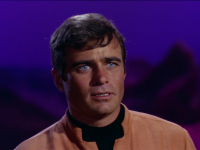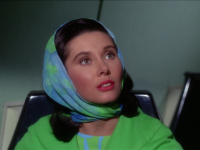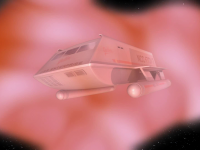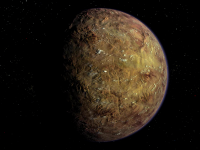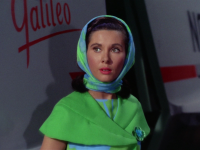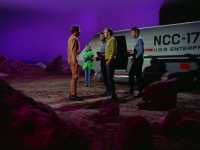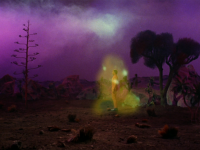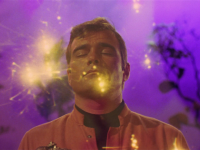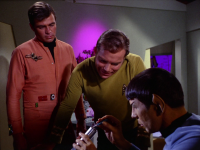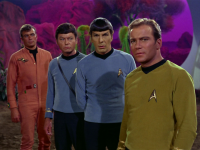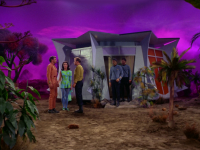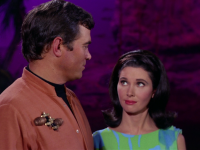Star Trek: The Original Series — 2x09 — Metamorphosis
Synopsis
The shuttlecraft Galileo makes a forced landing on a world with a single human inhabitant.
Filler rating: partial filler
The Zefram Cochrane character is first introduced in this episode, although it is his chronologically final appearance.
Remarkable scenes
- Cochrane's sudden appearance before the landing party.
- McCoy, regarding Cochrane: "Talks a lot, but he doesn't say much."
- The revelation of who Cochrane really is.
- Cochrane: "Believe me captain, immortality consists largely of boredom."
- Kirk enticing Cochrane to rejoin the universe.
- Kirk conspiring to attack Cochrane's companion.
- Kirk negotiating with the companion.
- Cochrane agreeing to stay with his now in human form companion.
Review
This was a charming story with a premise that should not have worked anywhere near as well as it actually did. If I were to describe the episode to someone as "Kirk, Spock, McCoy, and annoying Federation bureaucrat of the week crash land onto a random alien planet," I would likely receive yawns in response. However, adding in details like "whereupon they discover the long lost Zefram Cochrane, the inventor of warp drive, still alive despite being aged over 200 years, sustained by a neurotic alien entity which has fallen in love with him," I suspect I might raise a few more eyebrows.
The appeal of this episode lies solely with Cochrane. It takes an unfortunate twelve minutes into the story before the narrative finally allows Cochrane to reveal his backstory (we can't let the plot move forward too quickly now, can we!), but when he finally does, the implications are fascinating. What kind of life has this man led? As he interacts with the landing party, the story grapples with concepts like immortality, eternal captivity, and inter-species love in remarkably compelling ways.
However, I would have enjoyed a deeper exploration of Cochrane's life on pre-Federation Earth. Why did he invent warp drive? How did he achieve the breakthrough? What were relations with the Vulcans like before the Federation existed? Given Cochrane's "parochial" and arguably racist and xenophobic attitude towards aliens, I can only imagine that Cochrane's era was a considerably different one. But the episode spends little time on the totality of Cochrane's long, storied past.
Both Nancy Hedford's character as well as the entity fell considerably more flat, as Nancy spent most of her time acting irrationally and the entity came off as a female version of Nomad. Even with the two of them combined at the end of the episode, there still wasn't enough personality between them to add up to being a compelling character. It's also worth noting that the companion unilaterally inhabiting Nancy's body could be seen as morally questionable, but since Nancy seemed to be all for it after the fact, it could be dismissed as voluntary. I suppose since her only other choice was death, the moral ambiguity is somewhat moot.
Speaking of death, I found it intriguing that Kirk repeatedly argued that the eternal captivity of Cochrane and the landing party would lead to their deaths. Kirk's statement was at best a metaphor and at worst a lie. Nevertheless, it was a perceptively persuasive tactic. Kirk basically recognized that the landing party was brought to this planet because Cochrane wished for companionship. Kirk expanded on Cochrane's dissatisfaction with the boredom of captivity to convince to the entity that her solution would be ineffective in the long term because that boredom would merely reassert itself in short order. Sure, some of his rhetoric may have been a bit less than accurate, but what good diplomat doesn't fudge the truth every now and then? ;)
A final wrinkle in the story is Kirk's refusal to reveal the discovery of Cochrane to the Federation, nor the true fate of Nancy. I can understand Cochrane's desire to avoid fame, but doesn't Nancy have at least a single person in the Federation who cares about her? Parents, siblings, family of any kind? Won't they want to know what happened to her? Won't they want to come visit her? Perhaps throw a wedding party? Kirk was responsible for Nancy's safety, as he himself so appropriately pointed out in the middle of the story. It was irresponsible for him to lie about her fate after the fact.
Overall though this was a terrific story. I'd love to see the Zefram Cochrane character again in subsequent episodes or at least learn more about his apparently pivotal role in the history of Earth and the Federation.
